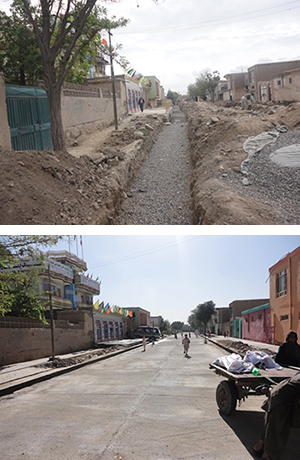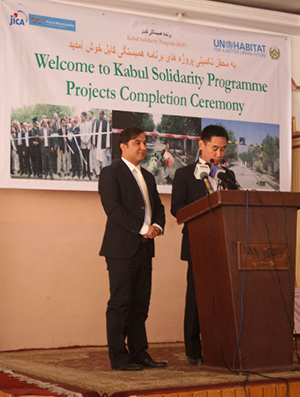Background

The need for infrastructure and basic services remain large in Kabul, which receives a huge influx of people migrating to the city from all over the country, due to the expected better employment opportunities compared to rural areas, and deteriorating security condition in the south. The currently estimated over four million inhabitants are living in many informal areas and the city is growing rapidly and the poor living environment and poverty makes the city prone to social and political instability. Given a successful pilot scheme of the Kabul Solidarity Programme (KSP) implemented in 2011, the Municipality of Kabul wishes to roll out its community-driven development projects to other districts of Kabul and to continue supporting deliver effective services to its population in the longer term. In line with increase in the government’s focus on the National Priority Programmes (NPP), KSP particularly plays a key role in supporting for one of the components of the NPP (Local Governance).
Objective(s)
The programme aims to demonstrate a combination of delivering basic services, empowering community people and strengthening local government who will take over and initiate further delivering services to the people in the near future. It also contributes to improving living conditions and well-being of Kabul citizens through strengthening local governance and settlement upgrading with community empowerment, improvement of infrastructure and services and support for the local government.
Main Outputs

- • Establishing Neighbourhood Development Councils (NDC) and its clusters to improve infrastructure and access to services in Kabul; and,
- • Strengthening capacity of the Kabul Municipality to better undertake urban programming and enable them to provide due support to communities in the effective implementation of services and infrastructure, revenue collection, and other community development activities.
Key expected achievements
- • A number of city populations to be able to have access to urban infrastructures and services through empowering communities and strengthening municipal capacity;
- • Kabul Municipality to build its capacity to develop urban planning and deliver services with a good financial management and governance system
- Overview
- Community Development Project: National Solidarity Programme (NSP)
- Afghanistan Urban Peacebuilding Programme (AUPP)
- Future of Afghan Cities Programme (FoAC)
- Kabul Solidarity Programme Phase 2
- Community-Based Municipal Support Programme
- Kabul Solidarity Programme
- Developing Irrigation Associations for On-Farm Water Management Project
- Behaviour Change Communication
- Assessment of Options for Community Benefit Sharing for CASA-1000
- Urban Solidarity Programme
- Reintegration of Returnees and IDPs through Policy, Planning and Targeted Assistance (EU8)
- Strengthening Municipal and Community Development in Lashkar Gah – Phase III
- Peace-Building in Afghanistan through Consolidation of Community Solidarity (PACCS)
- Reintegration of Returnees and Internally Displaced Persons (IDPs) through Policy, Planning and Targeted Assistance (EC7)
- Strengthening Municipal and Community Governance in Lashkar Gah - Phase II
- Community Empowerment and Development for Peace Building
- Learning for Community Empowerment Programme (LCEP Phase 2)
- Reintegration of Returnees and IDPs through Policy, Planning and Targeted Assistance (EC6)
- Behaviour Change and Communication
- Governance and Development Support Programme in Kandahar (GDSP)
- NSP - Spinboldak and Khakrez in District of Kandahar
- Upgrading Informal Settlements in Kandahar City
- Youth Empowerment Project (YEP)
- Inter-Communal Rural Development Project (IRDP)






































